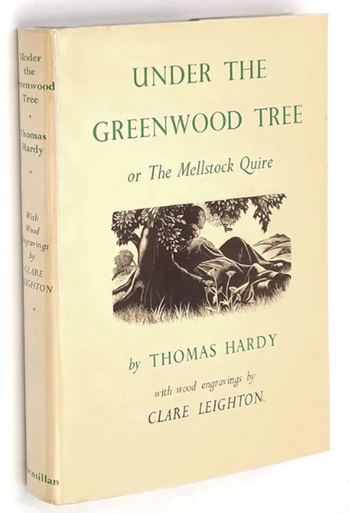
Our familiar local Dorset writer and poet, Thomas Hardy, wrote the novel Under The Greenwood Tree, with a second title of The Mellstock Quire, which was Hardy’s own preference. It was published anonymously in 1872, 150 years ago, by Macmillan in two volumes and became a notable success. It tells the story of simple, likeable country people, who fall in love and eventually marry, despite the woman being pursued by several potential suitors.
I first read the novel over 30 years ago, after we decided to move to Dorset. I mentioned to a colleague that I would have to start reading Hardy, and she replied that I should start with this one, as it was basically happy and humorous, and full of country life. She was quite right.
The main character is Dick Dewy, son of Reuben Dewy, a “tranter”, or carrier with a horse and cart. Dick falls in love at first sight with Fancy Day, who has recently returned to the area to teach at the local school. Fancy is the daughter of Geoffrey Day, Head Gamekeeper and Timber Steward for the Earl of Wessex, with 5 acres of land, so somewhat above the station of Dick.
Two other, more suitable, candidates for the hand of Fancy appear: the new vicar, Mr. Maybold, and a local farmer, Mr. Shiner. This is the triangle around Fancy, which is the core part of the story.
The main location of the story is Hardy’s Mellstock, which Herman Lea defines as Stinsford in The Hardy Guides with excursions to Bockhampton, Kingston Maurward and even Weymouth, (Budmouth). Lea described himself as the touring and photographer companion of Thomas Hardy.
Dick’s father, Reuben, is the acknowledged leader of a band of men known as the Quire, who play rudimentary instruments in the church gallery for church services, especially at Christmas. The band was addressed by Reuben as “my sonnies” and included Grandfather William, with his bass-viol, Michael Mail, with a fiddle under his arm, Robert Penny, boot and shoemaker, Elias Spinks, Joseph Bowman and Thomas Leaf. The hero of the story, Dick, played the treble violin, Rueben, the tenor and Michael the second violin. Some of the instruments were hand-me-downs and some homemade, as were the books of music each carried. These men, and four others, with seven boys, constituted the Quire.
On Christmas Eve the players congregated at Reuben’s house for tuning up and drinking much of Rueben’s homemade cider, then at midnight they set out to sing carols at various houses in the neighbourhood. This came as a surprise to me, as I had been a choir boy in our village church and we went out about a fortnight before Christmas, leaving about 6 pm and concluding about 10 pm at the latest. We visited most houses in our neighbourhood and generally collected cash at each, recorded in a book which was returned to the Church. As in Mellstock, we frequently encountered snow, but were not fortified with cider.
Cider seems to have been very popular in the time Hardy wrote about and was regularly made at home from the fruit of apple trees grown in home gardens. One type of tree was described as The Bockhampton. Hardy also refers to beekeeping as a popular activity with the eventual honey making and consumption.
A black cloud hangs over the Quire. The new vicar, Mr. Maybold, has a small organ, or melodeon, and has found out that Fancy Day can play it. Therefore, he tells the Quire that they will no longer be required in the church gallery. After some discussion, it was decided that this fate could be put off until Michaelmas, and much could happen by then.
There was a party at Rueben’s house on Christmas night. Dancing was forbidden until after midnight. Then country dancing commenced, with “Triumph”, or “Follow my Lover’’ followed by “Six-Hands-Round”. Later there was supper, laced with cider, ale, mead and homemade wine. All this dancing, several people deep, took place in a cottage said to be modelled on Hardy’s family home in Higher Bockhampton.
I hope that this brief article will encourage you to read or re-read the novel yourself. I have not been able to describe the scenery, as Hardy could, or the people sufficiently. Yet it does not seem like 150 years ago. I recall one winter when snow prevented many of my fellow students from going to school and the remainder of us were directed to the school hall, where we spent the time country dancing to keep us warm!
Thomas Hardy penned a poem Friends Beyond which has some familiar names:
“William Dewy, Tranter Reuben, Farmer Ledlow late at the plough,
Robert’s kin, and John’s, and Ned’s,
And the Squire, and Lady Susan, lie in Mellstock churchyard now!”
Later Sir John Betjeman published Dorset, possibly a parody, which I have abbreviated:
“Rime Intrinsica, Fontmell Magna, Sturminster Newton and Melbury Bubb,” –
“While Tranter Reuben, T.S.Eliot, H.G. Wells and Edith Sitwell, lie in Mellstock Churchyard now.”
“While Tranter Reuben, Gordon Selfridge, Edna Best and Thomas Hardy, lie in Mellstock Churchyard now.”
A note states that the last lines of these stanzas are put in not out of malice or satire but merely for their euphony.
Cecil Amor, Hon President, Bridport History Society




